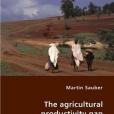《The Agricultural Productivity Gap- Comparative Advantage Concerning Agriculture in Developing Countries》是一本圖書,作者是Sauber, Martin。
基本介紹
- 作者:Sauber, Martin
- 頁數:68 頁
- 定價:61.02 美元
- ISBN:9783836405881
- 外文名:The Agricultural Productivity Gap- Comparative Advantage Concerning Agriculture in Developing Countries
內容簡介
Africa is backward in economic growth, food security, child nutrition, and health, and is combating environmental degradation, is beset by conflicts, and has the highest population growth rate in the world. One of the core contributing factors is the weak performance of the agricultural sector. Liberalisation of agricultural markets became a core issue in development policy, bu...(展開全部) Africa is backward in economic growth, food security, child nutrition, and health, and is combating environmental degradation, is beset by conflicts, and has the highest population growth rate in the world. One of the core contributing factors is the weak performance of the agricultural sector. Liberalisation of agricultural markets became a core issue in development policy, but this does not address the problem. This study discusses the question of whether developing countries have lost their comparative advantage in agricultural products due to a change in productivity growth rates. Firstly, agricultural productivity in developed countries increases immensely in comparison with developing countries; this leads to a growing international productivity gap. Secondly, productivity growth rates in the agricultural sector exceed those in the industrial sector. The first observation results in a loss of competitiveness and the first and second together cause a diminishing comparative advantage in agriculture in developing countries. The book offers interesting perspectives about the growing global divergence with strong theoretical foundations and empirical evidence. It is aimed at policy makers, professionals, academics, and students of economics and political sciences, and anyone with an interest in development study.

